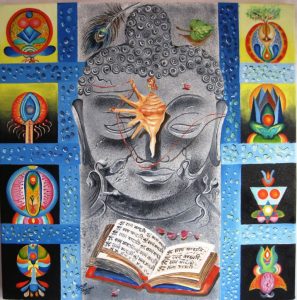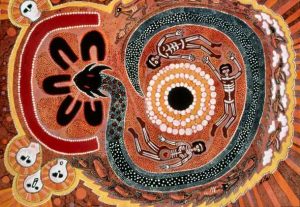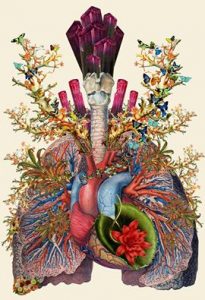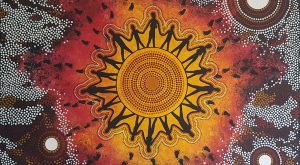 The Yogabliss on-line Moving into Meditation class met this morning. We explored how stories shape our lives. When we sit down to meditate, we reclaim our attention perhaps our most precious resource. Our awareness empowers us. It enables us to experience our shared humanity. Our circle of caring inspires me to go deeper, reach further. I’m breathing thank you’s now.
The Yogabliss on-line Moving into Meditation class met this morning. We explored how stories shape our lives. When we sit down to meditate, we reclaim our attention perhaps our most precious resource. Our awareness empowers us. It enables us to experience our shared humanity. Our circle of caring inspires me to go deeper, reach further. I’m breathing thank you’s now.
During our relaxed reflection we drew on essayist Rebecca Solnit’s book, Call Them by Their True Names. Rebecca describes how stories come to live inside us. To be fully conscious, we need to see them, question them and often transform them to co-create a more just world.
We heard from writer and social activist, Parker Palmer’s book, Healing the Heart of Democracy. He asks us to be guided by what we know in our hearts, to hear and speak “heart-talk” so that we can “act humanely on what we know.”
In his On Being interview, Fortifying Imagination, we heard Jason Reynolds‘ urgent call for loving and supporting our young people as they strive to create a better world. Jason’s written a new companion to Ibram X. Kendi’s history of racism, Stamped From the Beginning, for young readers: Stamped: Racism, Antiracism, and You: A Remix.
Relaxed Reflection
Bring your awareness home to your body . . . you can expand your awareness to fill the whole field of your body . . . noticing where your awareness lands . . . pausing to feel and to listen . . .
 Can you tune in to how your being responds to these precious moments of rest? What is it like to be fully present with your inner experience? Can you open your awareness like looking at the sky or a mountain . . . out over the ocean? Can you explore your awareness as a way of nourishing your heart and your mind? Step out of the steady stream of habit we begin to experience what it is like to simply be . . . human being . . . We can nourish ourselves with moments of restful presence . . . Right now we can reflect on how we give ourselves these moments throughout our day. We can consider how and what we give this precious resource – our attention – to. What is the quality of attention we give our family members . . . our friends? . . . How do we attend to what matters most to us?
Can you tune in to how your being responds to these precious moments of rest? What is it like to be fully present with your inner experience? Can you open your awareness like looking at the sky or a mountain . . . out over the ocean? Can you explore your awareness as a way of nourishing your heart and your mind? Step out of the steady stream of habit we begin to experience what it is like to simply be . . . human being . . . We can nourish ourselves with moments of restful presence . . . Right now we can reflect on how we give ourselves these moments throughout our day. We can consider how and what we give this precious resource – our attention – to. What is the quality of attention we give our family members . . . our friends? . . . How do we attend to what matters most to us?
We can take back our attention from what really doesn’t matter as much . . . We can recognize what might be shaping our hearts and minds. What stories are we living with and how do they shape our lives?
In her book, Call Them By Their True Names, Rebecca Solnit writes:
 Stories surround us like air; we breathe them in, we breathe them out. The art of being fully conscious in personal life means seeing the stories and becoming their teller, rather than letting them be the unseen forces that tell you what to do. . . . It’s also to see and sometimes to break open or break apart the ambient stories, the stories that are already written . . .
Stories surround us like air; we breathe them in, we breathe them out. The art of being fully conscious in personal life means seeing the stories and becoming their teller, rather than letting them be the unseen forces that tell you what to do. . . . It’s also to see and sometimes to break open or break apart the ambient stories, the stories that are already written . . .
There are stories beneath the stories and around the stories. The recent event on the surface is often merely the hood ornament on the mighty social engine that is a story driving the culture. . . . they are immensely powerful forces. . . . They sit atop mountains of unexamined assumptions.
Part of the job of a great storyteller is to examine the stories that underlie the story you’re assigned, maybe to make them visible, and sometimes to break us free of them. . . .
Many of us are examining the assigned stories – making them visible – breaking free of them. In reclaiming our attention . . . we give ourselves time to think our own thoughts. We can reflect on the stories we are telling ourselves and the stories we are being told. We can ask ourselves: What is the heart of this story? When we look into the heart of a story we usually find human needs. We all need sustenance . . . security . . . freedom. We need connection and meaning. We can reflect on what is true in the heart of our stories . . . What needs are calling to be met? What matters most to you right now? How does it feel to acknowledge this deeper need? If you like, you can take a breath or two and give yourself time to feel. . . . We can reflect on how we may be fulfilling these needs . . . How do we consider and cooperate with others in meeting our needs?
In his book, Healing the Heart of Democracy, autor Parker Palmer writes:
 “Heart” comes from the Latin cor and points not merely to our emotions but to the core of the self, that center place where all of our ways of knowing converge — intellectual, emotional, sensory, intuitive, imaginative, experiential, relational, and bodily, among others. The heart is where we integrate what we know in our minds with what we know in our bones, the place where our knowledge can become more fully human. Cor is also the Latin root from which we get the word courage. When all that we understand of self and world comes together in the center place called the heart, we are more likely to find the courage to act humanely on what we know.
“Heart” comes from the Latin cor and points not merely to our emotions but to the core of the self, that center place where all of our ways of knowing converge — intellectual, emotional, sensory, intuitive, imaginative, experiential, relational, and bodily, among others. The heart is where we integrate what we know in our minds with what we know in our bones, the place where our knowledge can become more fully human. Cor is also the Latin root from which we get the word courage. When all that we understand of self and world comes together in the center place called the heart, we are more likely to find the courage to act humanely on what we know.
. . . There are some human experiences that only the heart can comprehend and only heart-talk can convey. . . .
We practice to cultivate the courage to “act humanely on what we know.” Right now we can reflect on how we hear and speak “heart-talk.” Sometimes we need a leap of imagination to act bravely. Other times we need to pause – to step out of the stream of doing – to breathe, to feel and feel with another . . . Empathy is one of the most precious gifts we can offer . . . Empathy often yields deeper understanding.
In his On Being interview Jason Reynolds describes what is calling his heart:
I feel rage now. But one has to know how to wield it. And I think, for me, I choose to put my rage into the energy of helping young people process the world around them. But it comes from a place of rage, and that rage is connected to a love, a true love, an aching love that I have for young people to grow into the people who will push forward freedom and anti-racism and an equitable world. I think they have it. I think they want it, in a way that we’ve never seen before. . . .
 Jason goes on to explain his heart-felt view of anti-racism as:
Jason goes on to explain his heart-felt view of anti-racism as:
. . . simply the muscle that says that humans are human. That’s it. It’s the one that says, I love you, because you are you. Period. That’s all.. . . And this is why racism has been the greatest hoax ever played on humans. It’s the greatest hoax ever, because that element of “I love you, because you are you” should be the most human thing we know. It should be a natural thing, to say, “I love you, because you remind me more of myself than not.”
I love you because you are you . . . I love you because you remind me more of myself than not . . .
I’d like to end with an aspiration from Tara Brach’s beautiful talk about Spiritual Hope:
May we each remember the loving awarness that’s our very essence
May we trust that loving awareness
May we be open to the many ways it can unfold and express through our life
May all beings awaken to the loving awareness that is our shared essence
May we collectively remember our caring and trust in our caring
May we act from our caring and create a world of peace a world of justice a world where all beings can express themselves creatively and freely
May we create the world we believe in
